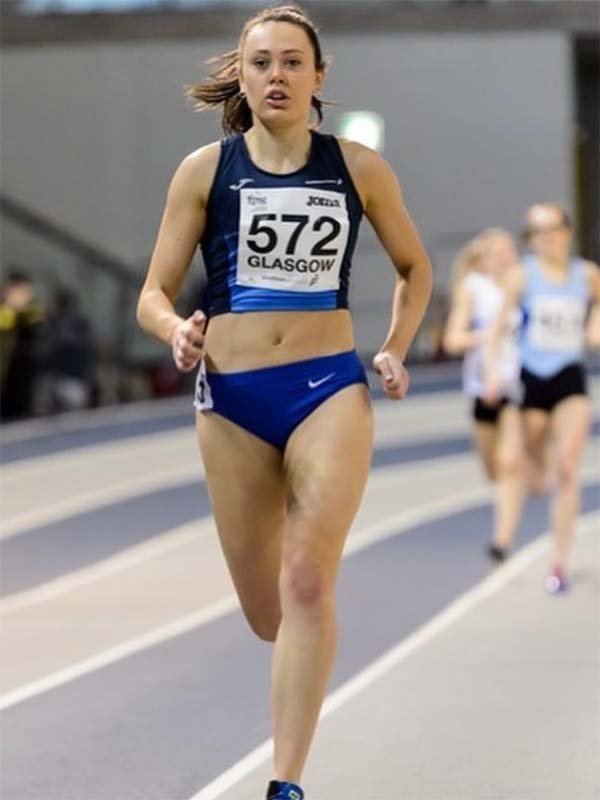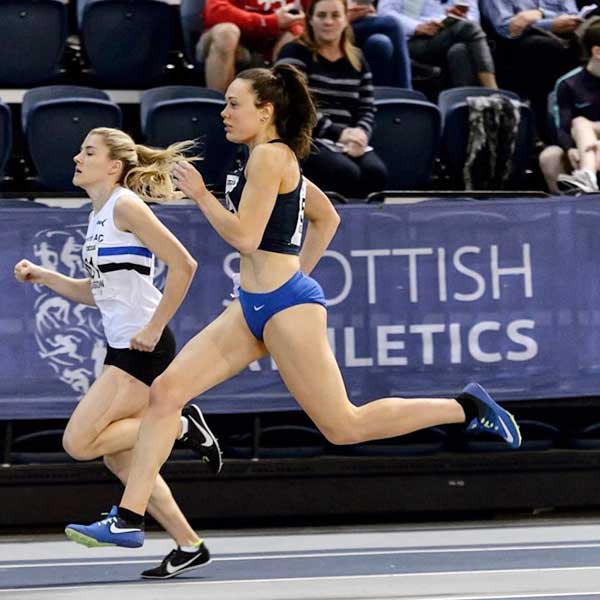
Physical activity and healthMhairi Patience
We last caught up with Mhairi in 2018 after she graduated from Strathclyde with a First Class Honours degree in Sport & Physical Activity.
Having completed her Masters degree at Loughborough, she's returned to Strathclyde to begin a PhD. We spoke with Mhairi to find out about her research and why she decided to come back to Strathclyde.
What's your PhD in?
My PhD research examines how movement behaviours such as physical activity, sitting and sleep during the 24-hour day interact and impact on the coping and management of type 1 diabetes in adolescents and their caregivers.
It’s a really exciting project as it creates a partnership between both the psychology and physical activity for health groups within the University by pulling together the expertise of my supervisors Dr Megan Crawford, Dr Alison Kirk and Dr Xanne Janssen.

We are currently looking at the possibility of creating a collaboration with NHS Lanarkshire which is an exciting and positive step toward creating real-world change.
After your undergraduate degree, your goal was to do a Masters and a PhD, and here you are! What's happened with you between then and now?
After my BSc, I got a part-time job at Strathclyde Sport. Then, in 2019 I headed to Loughborough to complete an MSc in Exercise as Medicine. Things were going really well there, I picked up a job as a research assistant and was due to head off to Florida for a training camp in March 2020 with my training group however, plans of course were halted due to the pandemic. I am sure many can identify with the disappointment of cancelled plans this year.
I moved back home and my MSc studies moved online which was a struggle at first trying to stay motivated but at the same time, it was a welcomed distraction during such an unusual and inconsistent time.
I completed my MSc in September 2020 with distinction and was awarded prizes for my academic work which was lovely news to receive after such a rough period of time. I then secured some funding through The Student Excellence Awards at Strathclyde University for my current PhD and here I am!
You were awarded a scholarship through the Performance Sports Scholarship Programme. How did that influence your decision to take on a PhD?
Being part of the programme previously during my undergrad at Strathclyde, I knew how supportive the Performance Sport Scholarship Programme was for both studying and training.
Then from working at Strathclyde Sport I experienced how comprehensive the facility itself was. A university with amazing training facilities and understanding staff is what all student-athletes are after and so this definitely contributed to my return. It feels great to be back with the Performance Sports Programme and I am looking forward to getting back to competing (hopefully) this year.
You've experienced life at another university. Why did you choose to come back to Strathclyde?
Loughborough University was an amazing experience both academically and from a training perspective. I also met some fantastic people I hope to stay in contact with. However, I really do love and feel at home in Glasgow. "Strathy" was also my uni for four years previously and I only have happy memories from it. Also, the banter from Glaswegians is hard to come by anywhere else…
From working at Strathclyde Sport I experienced how comprehensive the facility itself was. A university with amazing training facilities and understanding staff is what all student athletes are after...
It's been an unusual time to start your studies with the ongoing global pandemic. How have you adapted?
The idea of starting a PhD during a pandemic was a little daunting at first and I think it has taken me a while to adapt and if I am honest, I am still adapting. I think the main thing I am having to remember is you need to be kind to yourself and understand these circumstances are not normal. Setting small goals for myself each week has been key while acknowledging different tactics in achieving them might have to be used.
How do you find juggling your studies and athletics - what's a normal week like for you?
A typical weekday I would work throughout the day and head off to training at 5.30pm then on Saturday and Sunday I would have my morning sessions and spend the rest of the day doing things to recharge the batteries.
However, this routine has been hard to stick by this year due to the constant changes in COVID-19 related government guidance. My training facilities have switched from gym and track to home garage and football field due to everything closing. This means recently, during the winter, I need to get a session in when it is still light, so I have to adapt my work and training pretty much every day depending on meetings etc.

Generally, I try and aim to work a set number of hours each week for a guide, but it is difficult sticking to a set routine at the moment. Although this isn’t really ideal, not everyone is as lucky to have flexibility in their work routine so I am thankful this PhD can accommodate training, especially at this time.
What do you enjoy most about being a PhD student at Strathclyde?
Maybe this is a question better suited a couple of years down the line as I feel I am not getting the original, pandemic free, Strathy PhD experience currently!
My supervisors have been great from day one and have highlighted various opportunities for professional and personal development.
Nevertheless, I am enjoying the process given the circumstance. Even through Zoom, where I have met the majority of my peers and colleagues, there is a real sense of community and support. My supervisors have been great from day one and have highlighted various opportunities for professional and personal development, and I am sure that will continue throughout my research.
What do you hope to do after your PhD study?
Academia has always appealed to me however, after my MSc in Exercise as Medicine I think I would also really enjoy a clinical role.
Things change so quickly so it is hard to say as three years is a long time. There is a compulsory Research Development Programme (RDP) here at Strath that provides training opportunities to enhance professional development for postgraduate researchers. For example, I just entered an Images of Research Competition where you design an original image that summarises your research. I obviously couldn’t resist a bit of competition!
These opportunities will refine my skill set and expose me to new skills I could potentially use in future roles following my PhD.
What advice would you give to people thinking of pursuing PhD study at Strathclyde?
Before applying for PhD study I had to seek this advice myself. The four consistent nuggets of wisdom I received were:
- Choose a topic you are passionate about
- Talk to supervisors early on to ensure you arrive at a topic you are equally interested in
- Talk to existing PhD students before starting
- Investigate all the opportunities a PhD could offer, for example, living abroad, work experience, public speaking etc.
There are so many diverse ways to learn during a PhD, it is not all about writing a thesis so investigate the other things you may enjoy and benefit from.